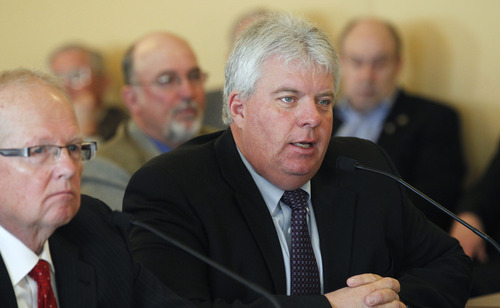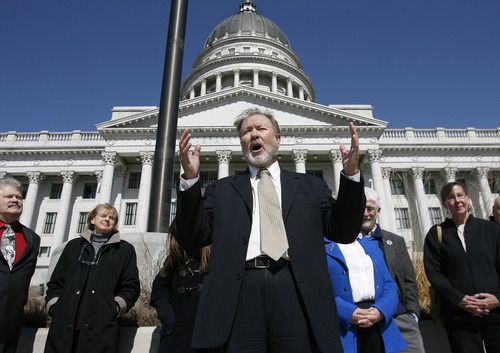This is an archived article that was published on sltrib.com in 2013, and information in the article may be outdated. It is provided only for personal research purposes and may not be reprinted.
Although no one is proposing to reintroduce the gray wolf in Utah, lawmakers want to spend $300,000 for the second consecutive year to lobby federal officials against such a move, arguing that the return of wolves, extirpated almost a century ago, would wipe out big game.
The line item, listed among priority one-time spending requests from the Legislature's natural resources budget committee, has drawn ridicule from conservationists and citizens who say these expenditures are a silly misuse of tax dollars that could be invested in education or other worthy programs.
"Utah is not overrun with wolves, but it is overrun with children in classrooms," said Marlene Foard, a 33-year Salt Lake City school teacher dismayed that Utah remains at the bottom among states in per-pupil spending. But Don Peay, the influential anti-wolf advocate seeking the money, says the Utah economy could take a massive hit should wolves, protected in Utah under the Endangered Species Act, gain a foothold.
"It's destroying jobs, private property and rural economies," said Peay, a founder of Big Game Forever,a Salt Lake City-based nonprofit organization told the Natural Resources, Agriculture and Environmental Quality budget committee, referring to what he claims is unfolding in Idaho since the successful wolf reintroduction in the Yellowstone region. "We want to keep Utah a great place to hunt and fish."
After hearing a similar pitch from Big Game Forever co-founder Ryan Benson, the Legislature last year appropriated $300,000 to fund wolf-related lobbying, with virtually no oversight of precisely how the money was used or what it accomplished. Big Game Forever submitted the only bid to do this lobbying on July 28, 2012, and won the one-year contract four days later.
That contract throughthe state Division of Wildlife Resources calls for the nonprofit to "work with state and federal agencies to pursue legal and legislative solutions to achieve [the state's] legal and management authority over wolves to protect wildlife." It specified that Benson was to be paid on completion of the work, but Michael Styler, the head of the Department of Natural Resources, DWR's parent agency, approved an immediate payout.
Styler's Aug. 6 letter to state purchasing officials four days after the contact was signed cites a provision in the division's request for proposals that allows payment upon receipt of an invoice. State policy generally prohibits paying contracts upfront, but the state's administrative rules allow agency heads to request early payment if they are willing to assume the risks, said Kent Beers, the state's purchasing director.
Styler — who two years ago in a legislative hearing called wolves "the resurrection of the T. rex," and "the perfect biological weapon" — said Thursday he could not recall his letter requesting upfront payment of the contract.
The wolf-lobby contract does require Big Game Forever to submit a report to DWR summarizing its accomplishments and giving an update on wolf-related legislation — but it is not due until June 30, 2013.
Now the Legislature is moving toward appropriating an additional $300,000.
There are no Washington lobbyists currently registered for Big Game Forever and have been none since April 1, 2011.
At a Feb. 21 appropriations hearing, Peay gave a vague response when asked about the work his group has accomplished with this money.
"It's been used to do a very complex, political, legal, grass-roots effort," he said. The current line item comes at the request of Senate Majority Leader Ralph Okerlund, R-Monroe, who did not respond to an email request for comment.
Opponents say such lobbying is pointless from the viewpoint of Utah taxpayers because it is unlikely robust wolf populations will ever become established in the Beehive State and federal wildlife officials have never proposed reintroducing them there. They also question the propriety of handing public money to a private group to advance a special interest.
The feds agreed two years ago to delist the gray wolf inside a recovery zone covering Montana, Wyoming, Idaho and a piece of northern Utah. A nationwide delisting is expected this year, a move that would allow Utah and other Western states to "manage" wolves without much federal interference.
The Northern Rockies gray wolf inhabited Utah and Colorado at the time of Mormon settlement and the smaller and distinctive Mexican gray wolf roamed Arizona, according to Kim Crumbo of the Grand Canyon Wildlands Council. The last native wolf in Utah was killed in San Juan County in the early 1930s, but descendants of those reintroduced in Yellowstone are now entering northern Utah.
Peay claims federal authorities are bent on recovering the Mexican wolf, regardless of the toll on agriculture.
"They want to put Mexican wolves in Utah because the Mexicans don't want them," he told lawmakers.
But there is not much truth to that, according to U.S. Fish and Wildlife Service officials.
A preliminary scientific report has identified parts of southern Utah as playing a potential role in the recovery of the Mexican wolf, said Laura Romin, the service's deputy field supervisor for Utah. A revision of this subspecies' 1982 recovery plan is underway and no decisions have been made about altering the recovery zone.
The agency has been releasing captive-raised wolves in Arizona's Blue Range as part of a re-introduction program underway since 1998 and their numbers in the wild have fluctuated between 40 and 60 over the years.
Peay and Benson, whose voicemail boxes are full, could not be reached Thursday.







